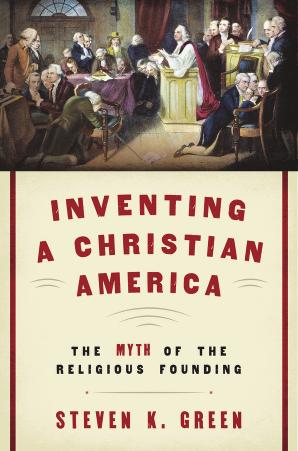Inventing a Christian America: The Myth of the Religious Founding by Steven K. Green

Author:Steven K. Green [Green, Steven K.]
Language: eng
Format: epub, pdf
Publisher: Oxford University Press
Published: 2015-06-01T04:00:00+00:00
Further examples of Washington’s penchant for religious allusions are found in his two presidential thanksgiving declarations (1789, 1795), where he refers to the “many signal favors of Almighty God,” the “beneficent Author of all the good that was,” the “great Lord and Rules of Nations,” among other language.99
To modern ears, these statements sound highly religious, with their affirmations of God’s greatness and their calls for humility and supplication. And in a sense they had religious meaning for Washington as well, as they likely reflected his personal beliefs (notwithstanding some of the language being ghost-written by Alexander Hamilton). But both the use and terminology do not suggest a degree of faith inconsistent with Washington’s latitudinarian and rationalist beliefs. As both Paul Boller and John Fea have demonstrated, his choice of terms for God—“Almighty Being,” “Divine Author,” and so on—are consistent with a deistic or rationalist cosmology. What should be considered more significant is the overall lack of orthodox Christian concepts in his declarations, such as human sinfulness or the atoning power of God (excluding his repeating the words of the Continental Congress in his General Orders). Consistent with his own latitudinarian beliefs and aversion to doctrinal disagreements, his religious declarations were always in a nonsectarian and religiously inclusive tone. Washington’s Farewell Address is even less declaratory of divine providence and more oriented toward the functional benefits of religion, noting that “religion and morality are indispensable supports” of political prosperity, and rejecting the notion that “morality can be maintained without religion.” At the same time, Washington’s religious declarations were common for the time, an expected part of ceremonial discourse. It would have been surprising for Washington to have deviated from such common practices. All in all, the degree to which Washington departed from the religious orthodoxy in his various declarations is far more significant than the extent to which his statements may have conformed to it.100
As with the other Founders, Washington’s personal faith is considered relevant for how he viewed the appropriate level of interaction between religion and government in the new republic. As he indicated in his Farewell Address, Washington considered religion and government to be interdependent and mutually reinforcing, in that religion was indispensable for ensuring public virtue and morality. And by virtue of his declarations, Washington obviously did not perceive any conflict between religious freedom and public acknowledgments of nonsectarian religion. As discussed in the following chapter, the majority of contemporaries likely saw no conflict either.101
One should be cautious, however, to draw more specific conclusions from Washington’s latitudinarian approach to religion. While he believed that religion and government should be mutually reinforcing, that relationship was chiefly for the benefit of society, not for spiritual redemption. Government could patronize the common religion for the reciprocal benefits it afforded organized society: order, morality, and civic virtue. But government had no role in making people more religious. And while Washington had few of the theoretical or libertarian instincts toward religion as Jefferson or Madison, he had an intuitive sense about the limits to church and state intermixing.
Download
Inventing a Christian America: The Myth of the Religious Founding by Steven K. Green.pdf
This site does not store any files on its server. We only index and link to content provided by other sites. Please contact the content providers to delete copyright contents if any and email us, we'll remove relevant links or contents immediately.
| Africa | Americas |
| Arctic & Antarctica | Asia |
| Australia & Oceania | Europe |
| Middle East | Russia |
| United States | World |
| Ancient Civilizations | Military |
| Historical Study & Educational Resources |
Cecilia; Or, Memoirs of an Heiress — Volume 1 by Fanny Burney(32546)
Cecilia; Or, Memoirs of an Heiress — Volume 2 by Fanny Burney(31944)
Cecilia; Or, Memoirs of an Heiress — Volume 3 by Fanny Burney(31929)
The Secret History by Donna Tartt(19052)
Sapiens: A Brief History of Humankind by Yuval Noah Harari(14368)
Leonardo da Vinci by Walter Isaacson(13316)
The Radium Girls by Kate Moore(12018)
Sapiens by Yuval Noah Harari(5366)
How Democracies Die by Steven Levitsky & Daniel Ziblatt(5215)
The Wind in My Hair by Masih Alinejad(5091)
Homo Deus: A Brief History of Tomorrow by Yuval Noah Harari(4908)
Endurance: Shackleton's Incredible Voyage by Alfred Lansing(4769)
Man's Search for Meaning by Viktor Frankl(4581)
The Silk Roads by Peter Frankopan(4526)
Millionaire: The Philanderer, Gambler, and Duelist Who Invented Modern Finance by Janet Gleeson(4465)
The Rape of Nanking by Iris Chang(4203)
Joan of Arc by Mary Gordon(4100)
The Motorcycle Diaries by Ernesto Che Guevara(4089)
Stalin by Stephen Kotkin(3957)
